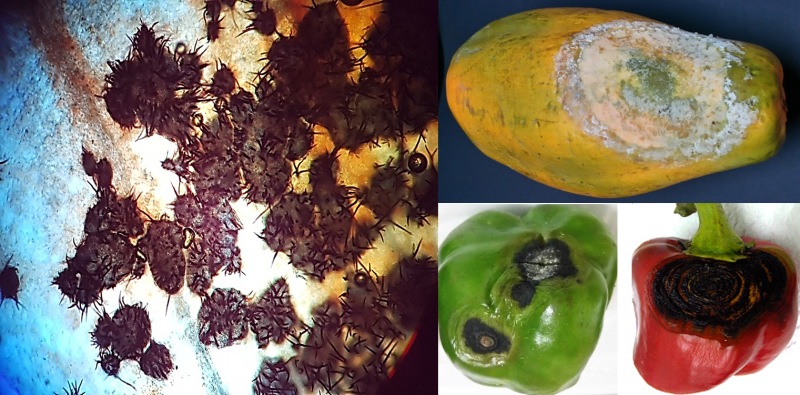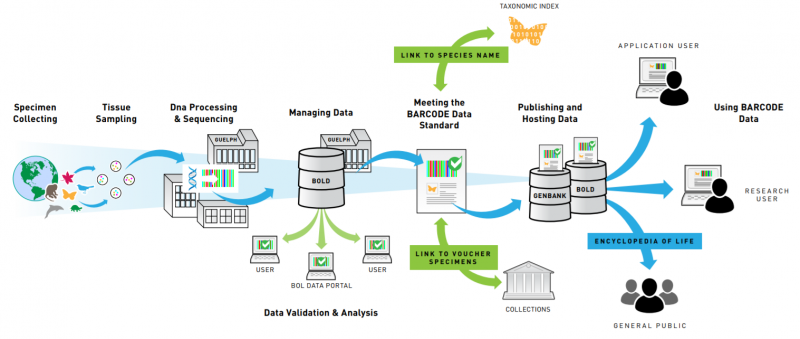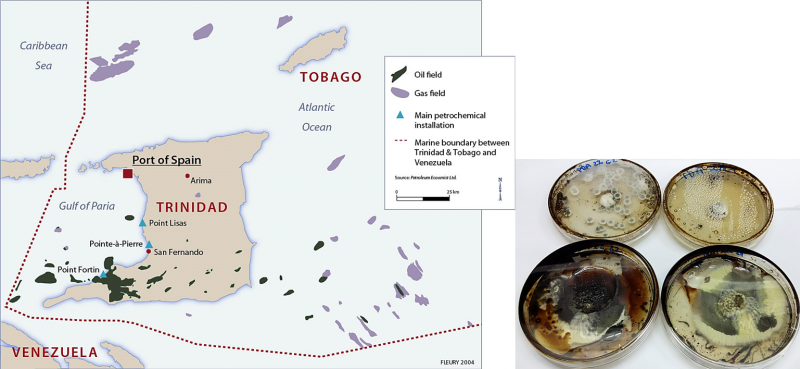Research
Research Programmes
Pathogen profiling of fungal phytopathogens

Food security is a global concern more so for small-island developing states with limited resources. The extract below describes food security according to a Policy Brief of the Food and Agriculture Organization (FAO, 2006):
- Food availability: The availability of sufficient quantities of food of appropriate quality, supplied through domestic production or imports.
- Food access: Access by individuals to adequate resources (entitlements) for acquiring appropriate foods for a nutritious diet. Entitlements are defined as the set of all commodity bundles over which a person can establish command given the legal, political, economic and social arrangements of the community in which they live.
- Utilization: Utilization of food through adequate diet, clean water, sanitation and health care to reach a state of nutritional well-being where all physiological needs are met. This brings out the importance of non-food inputs in food security.
- Stability: To be food secure, a population, household or individual must have access to adequate food at all times. They should not risk losing access to food as a consequence of sudden shocks (e.g. an economic or climatic crisis) or cyclical events (e.g. seasonal food insecurity).
Matura Biological Baseline Survey
Biological research has been carried out in Matura National Park since 2005, by the Department of Life Sciences of the University of the West Indies, in participation with Forestry Division personnel, the Matura National Park Stakeholder Management Committee and members of local communities. Research has been funded by the Environmental Management Authority, BP Trinidad & Tobago and the University of the West Indies.
ProEcoServ Trinidad and Tobago
The Project for Ecosystem Services (ProEcoServ) is a global initiative that aims to better integrate ecosystem assessment and economic valuation of ecosystem services into poverty reduction and national sustainable development planning. Trinidad and Tobago is one of five countries (along with Chile, Vietnam, South Africa and Lesotho) where ProEcoServ is being rolled out between 2010 and 2014.
The project will develop the capacity of decision makers, users and beneficiaries of ecosystem services to identify development choices that contribute to human well-being through strengthened biodiversity and ecosystem resilience.
DNA Barcoding as a species identification tool

Conventional identification involves assessment of morphological characters according to a taxonomic key. This requires experienced taxonomists and the organism/sample must have physically identifiable traits and must be in an intact state i.e. not degraded or decomposed. Species assignment is now supported by a DNA barcode – a specific DNA sequence that is unique to that species and no other. The barcode is generated from a defined gene region that is used as the standard barcode for a group of species. For example, for fungi, the universal barcode is the internally transcribed spacer region (ITS1-5.8S-ITS2), for animals - it’s the cytochrome oxidase I gene (COI), for plants - it’s the MatK, RBCL dual barcodes.
Mycoremediation of soil contaminated with crude oil

Trinidad is the largest crude oil and natural gas producer in the Caribbean. Over the last century, Trinidad has seen significant oil and gas exploration activity on land and in shallow water with cumulative oil production of over three (3) billion barrels of oil. However, the country’s hydrocarbon sector experienced a shift from oil to a mostly natural gas in the early 1990s. Overall, the energy sector continues to be an integral part of the economic growth and development of the country as it is still a critical source of government revenue. Over the last 5 years, oil has also been the source of Trinidad’s worst environmental disasters in history. Between 17 December 2013 and 29 December 2013 alone, there have been 11 oil spills with a reported leakage of 7,000 barrels. Chemical management of oil spills is quick and toxic (e.g. Corexit which was used in the Deep Horizon disaster), while microbial management is slow but with much lower toxicity thresholds.
Caroni Swamp RDI Project
The study we propose will build on the relationships and experience our team has established in development of the TEEB protocols. Specifically, we will undertake a TEEB analysis of the total economic value (TEV) of the Caroni Swamp. This wetland is ideal for such an analysis, because of its national cultural, socio-economic and conservation value, and because of a long history of baseline studies already undertaken at this site (e.g. Bacon 1968, Ramdial 1975,). These baseline studies provide a useful springboard for a TEV, as they provide historical measures of use and non-use values at the swamp.











